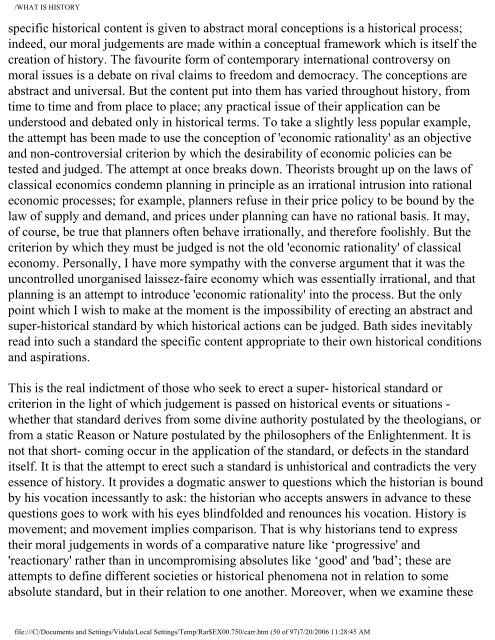What is History / by Edward Hallett Carr - Universal History Library
What is History / by Edward Hallett Carr - Universal History Library
What is History / by Edward Hallett Carr - Universal History Library
You also want an ePaper? Increase the reach of your titles
YUMPU automatically turns print PDFs into web optimized ePapers that Google loves.
WHAT IS HISTORY<br />
specific h<strong>is</strong>torical content <strong>is</strong> given to abstract moral conceptions <strong>is</strong> a h<strong>is</strong>torical process;<br />
indeed, our moral judgements are made within a conceptual framework which <strong>is</strong> itself the<br />
creation of h<strong>is</strong>tory. The favourite form of contemporary international controversy on<br />
moral <strong>is</strong>sues <strong>is</strong> a debate on rival claims to freedom and democracy. The conceptions are<br />
abstract and universal. But the content put into them has varied throughout h<strong>is</strong>tory, from<br />
time to time and from place to place; any practical <strong>is</strong>sue of their application can be<br />
understood and debated only in h<strong>is</strong>torical terms. To take a slightly less popular example,<br />
the attempt has been made to use the conception of 'economic rationality' as an objective<br />
and non-controversial criterion <strong>by</strong> which the desirability of economic policies can be<br />
tested and judged. The attempt at once breaks down. Theor<strong>is</strong>ts brought up on the laws of<br />
classical economics condemn planning in principle as an irrational intrusion into rational<br />
economic processes; for example, planners refuse in their price policy to be bound <strong>by</strong> the<br />
law of supply and demand, and prices under planning can have no rational bas<strong>is</strong>. It may,<br />
of course, be true that planners often behave irrationally, and therefore fool<strong>is</strong>hly. But the<br />
criterion <strong>by</strong> which they must be judged <strong>is</strong> not the old 'economic rationality' of classical<br />
economy. Personally, I have more sympathy with the converse argument that it was the<br />
uncontrolled unorgan<strong>is</strong>ed la<strong>is</strong>sez-faire economy which was essentially irrational, and that<br />
planning <strong>is</strong> an attempt to introduce 'economic rationality' into the process. But the only<br />
point which I w<strong>is</strong>h to make at the moment <strong>is</strong> the impossibility of erecting an abstract and<br />
super-h<strong>is</strong>torical standard <strong>by</strong> which h<strong>is</strong>torical actions can be judged. Bath sides inevitably<br />
read into such a standard the specific content appropriate to their own h<strong>is</strong>torical conditions<br />
and aspirations.<br />
Th<strong>is</strong> <strong>is</strong> the real indictment of those who seek to erect a super- h<strong>is</strong>torical standard or<br />
criterion in the light of which judgement <strong>is</strong> passed on h<strong>is</strong>torical events or situations -<br />
whether that standard derives from some divine authority postulated <strong>by</strong> the theologians, or<br />
from a static Reason or Nature postulated <strong>by</strong> the philosophers of the Enlightenment. It <strong>is</strong><br />
not that short- coming occur in the application of the standard, or defects in the standard<br />
itself. It <strong>is</strong> that the attempt to erect such a standard <strong>is</strong> unh<strong>is</strong>torical and contradicts the very<br />
essence of h<strong>is</strong>tory. It provides a dogmatic answer to questions which the h<strong>is</strong>torian <strong>is</strong> bound<br />
<strong>by</strong> h<strong>is</strong> vocation incessantly to ask: the h<strong>is</strong>torian who accepts answers in advance to these<br />
questions goes to work with h<strong>is</strong> eyes blindfolded and renounces h<strong>is</strong> vocation. H<strong>is</strong>tory <strong>is</strong><br />
movement; and movement implies compar<strong>is</strong>on. That <strong>is</strong> why h<strong>is</strong>torians tend to express<br />
their moral judgements in words of a comparative nature like ‘progressive' and<br />
'reactionary' rather than in uncomprom<strong>is</strong>ing absolutes like ‘good' and 'bad’; these are<br />
attempts to define different societies or h<strong>is</strong>torical phenomena not in relation to some<br />
absolute standard, but in their relation to one another. Moreover, when we examine these<br />
file:///C|/Documents and Settings/Vidula/Local Settings/Temp/Rar$EX00.750/carr.htm (50 of 97)7/20/2006 11:28:45 AM







